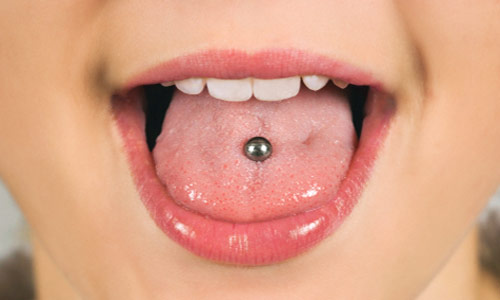
Oral Piercings
Oral piercing and tongue splitting are forms of body art and self-expression in today’s society. Tongue piercing has become very popular, especially among teenagers and young adults. Most people generally believe that tongue piercing is a safe and fun way for young people to express themselves, similar to ear piercing. Unfortunately, tongue piercing can cause significant damage to our teeth and gums as well as risks to our general health.
As with any procedure involving a puncture wound or incision, early complications can include pain, swelling or prolonged bleeding. There are however, many other complications that may arise.
Broken or Chipped Teeth. It is not uncommon to see otherwise healthy teeth chipped or fractured from a tongue piercing. People chip teeth on tongue piercings while eating, sleeping, talking and chewing on the jewelry.
Receding Gums. Chronic irritation from a lip or tongue piercing can cause gingival tissue to shift out of place, exposing the tooth. Even if the piercing does not feel bothersome, the repetitive rubbing against soft tissues will still cause gradual damage to the tissues. There may or may not be discomfort associated with the jewelry rubbing against the gums.
Allergic Reaction. Depending on the type of metal the piercing is made of, an allergic reaction could arise causing further complications. Not all piercings are done with a high quality surgical grade stainless steel.
Infection. One of the most common piercing complications is infection. The mouth is full of bacteria, and when the tongue is pierced, that bacteria could get into the bloodstream or tongue tissues. Unfortunately the symptoms of infection such as swelling, redness or pain, are quite similar to the after effects of piercings. Recently, medical research has shown that oral infection can lead to more serious infections or disease in other parts of the body.
Nerve Damage. Numbness or loss of sensation at the site of the tongue piercing or movement problems can occur if nerves have been damaged during the piercing.
Speaking, Chewing and Swallowing. Tongue piercing can result in difficulty in speaking clearly and annunciating properly. Chewing and swallowing food can also be a challenge due to the excessive salivary production. Temporary or permanent drooling is another consequence of increased saliva production. Furthermore, jewelry that becomes loose in the mouth can become a choking hazard and, if swallowed, can result in injury to the digestive track.
The American Dental Association currently opposes tongue piercing due to such potential complications, and recommends professionals to discourage patients who request the procedure by educating them of the risks associated with this procedure.
Leave a reply →